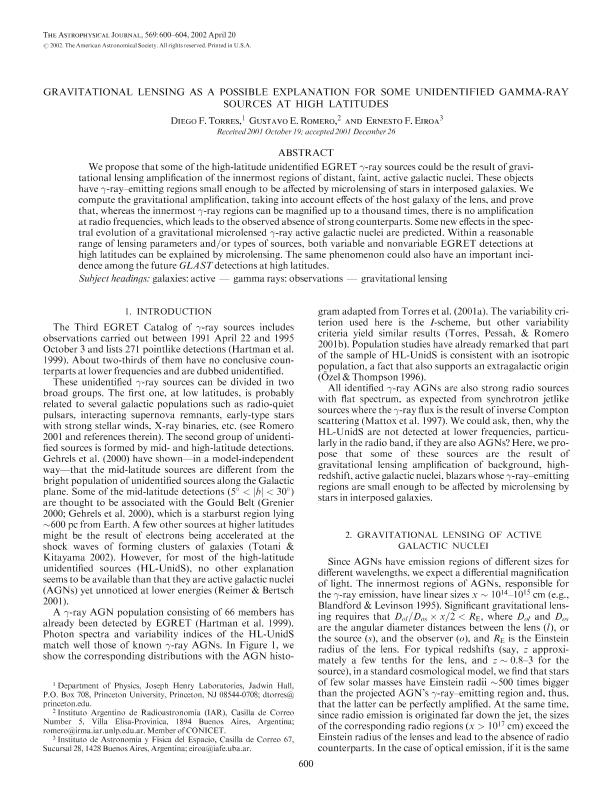Mostrar el registro sencillo del ítem
dc.contributor.author
Torres, Diego F.

dc.contributor.author
Romero, Gustavo Esteban

dc.contributor.author
Eiroa, Ernesto Fabian

dc.date.available
2017-12-18T16:08:49Z
dc.date.issued
2002-12
dc.identifier.citation
Eiroa, Ernesto Fabian; Romero, Gustavo Esteban; Torres, Diego F.; Gravitational lensing as a possible explanation for some unidentified gamma-ray sources at high latitudes; IOP Publishing; Astrophysical Journal; 569; 12-2002; 600-604
dc.identifier.issn
0004-637X
dc.identifier.uri
http://hdl.handle.net/11336/30876
dc.description.abstract
We propose that some of the high-latitude unidentified EGRET -ray sources could be the result of gravitational lensing amplification of the innermost regions of distant, faint, active galactic nuclei. These objects have -ray–emitting regions small enough to be affected by microlensing of stars in interposed galaxies. We compute the gravitational amplification, taking into account effects of the host galaxy of the lens, and prove that, whereas the innermost -ray regions can be magnified up to a thousand times, there is no amplification at radio frequencies, which leads to the observed absence of strong counterparts. Some new effects in the spectral evolution of a gravitational microlensed -ray active galactic nuclei are predicted. Within a reasonable range of lensing parameters and/or types of sources, both variable and nonvariable EGRET detections at high latitudes can be explained by microlensing. The same phenomenon could also have an important incidence among the future GLAST detections at high latitudes.
dc.format
application/pdf
dc.language.iso
eng
dc.publisher
IOP Publishing

dc.rights
info:eu-repo/semantics/openAccess
dc.rights.uri
https://creativecommons.org/licenses/by-nc-sa/2.5/ar/
dc.subject
Active Galaxies
dc.subject
Gamma Ray Observations
dc.subject
Gravitational Lensing
dc.subject.classification
Astronomía

dc.subject.classification
Ciencias Físicas

dc.subject.classification
CIENCIAS NATURALES Y EXACTAS

dc.title
Gravitational lensing as a possible explanation for some unidentified gamma-ray sources at high latitudes
dc.type
info:eu-repo/semantics/article
dc.type
info:ar-repo/semantics/artículo
dc.type
info:eu-repo/semantics/publishedVersion
dc.date.updated
2017-11-16T14:44:03Z
dc.journal.volume
569
dc.journal.pagination
600-604
dc.journal.pais
Estados Unidos

dc.description.fil
Fil: Torres, Diego F.. University of Princeton; Estados Unidos
dc.description.fil
Fil: Romero, Gustavo Esteban. Provincia de Buenos Aires. Gobernación. Comisión de Investigaciones Científicas. Instituto Argentino de Radioastronomía. Consejo Nacional de Investigaciones Científicas y Técnicas. Centro Científico Tecnológico Conicet - La Plata. Instituto Argentino de Radioastronomía; Argentina
dc.description.fil
Fil: Eiroa, Ernesto Fabian. Consejo Nacional de Investigaciónes Científicas y Técnicas. Oficina de Coordinación Administrativa Ciudad Universitaria. Instituto de Astronomía y Física del Espacio. - Universidad de Buenos Aires. Facultad de Ciencias Exactas y Naturales. Instituto de Astronomía y Física del Espacio; Argentina
dc.journal.title
Astrophysical Journal

dc.relation.alternativeid
info:eu-repo/semantics/altIdentifier/doi/http://dx.doi.org/10.1086/339348
dc.relation.alternativeid
info:eu-repo/semantics/altIdentifier/url/http://iopscience.iop.org/article/10.1086/339348/meta
Archivos asociados
